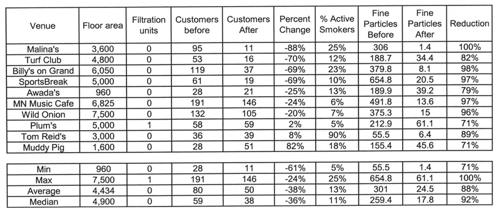Anti-rokengroepen houden bevindingen achter
Eigenlijk is het hiernavolgende geen nieuws in de zin van dat het zo opvallend is. Het is gewoon een zoveelste geval waaruit blijkt hoe misleidend en leugenachtig anti-rokengroepen te werk gaan.
Twee anti-rokenorganisaties in Minnesota publiceerden een paar weken geleden een verslag van hun bevindingen rond een onderzoek naar de luchtkwaliteit in de horeca na een ingevoerd rookverbod. De luchtkwaliteit was enorm toegenomen concludeerden ze.
Een oplettende journalist van een lokale krant, die steeds meer begint te twijfelen aan dit soort ‘onderzoeken’, eiste de ruwe gegevens op die door de twee clubs waren verzameld en deed een aantal verrassende ontdekkingen. De anti-rokers hadden een paar belangrijke bevindingen niet gepubliceerd:
- Ze hadden gemeten dat de bezoekersaantallen in zeven van de tien onderzochte bars drastisch naar beneden waren gegaan (tot 88% toe!), ondanks dat deze organisaties, in tegenstelling tot de tegenstanders van een rookverbod, altijd beweerd hadden dat dat niet zou gebeuren.
- Merkwaardig genoeg verbeterde de luchtkwaliteit in de bars waar de bezoekersaantallen daalden veel meer dan in die waar het aantal steeg.
Een mooi citaat uit het artikel: “Anti-rokengroepen gebruiken wetenschap zoals een dronkeman een lantaarnpaal: niet om te verlichten maar om steun te zoeken“.
Junk science is junk science because it creates an absurdity from a grain of truth, like a recent press release from the Association for Nonsmokers. That makes us mad. It also provides a teachable moment.
Scientific discoveries provide us with insights into how we might live better and better manage our environment, but they don’t demand that we do so. That is where government policymakers often step in.
Increasingly, elected officials are asked to make public policy based on scientific evidence. A comprehensive smoking ban is just one example. Mandates for environmental mercury reduction and the medical marijuana and vaccine safety controversies have pro and con arguments based on competing scientific views. Obesity as a public health issue is on the horizon. Genetic screening, stem-cell research, global warming policy, all require us to understand the basic science at issue.
Wading through jargon-laced studies and applying science to public policy is difficult enough, which is why it angers us when smoking ban supporters use science the way a drunk uses a streetlight — for support, not for illumination.
Let us be clear: We support a comprehensive indoor smoking ban, including bars and restaurants. We believe that legitimate evidence supporting the health hazards of smoking and data demonstrating the societal cost of smoking are sufficient to justify a smoking ban as a means to reduce both.
Having said that, we also regret an increasing tendency to exaggerate science, not just in the smoking ban debate, but virtually wherever science and public policy collide. We also believe there is a clear line between exaggeration and purposeful deception; the Association of Nonsmokers and ClearWay Minnesota (formerly MPAAT) crossed that line.
An Aug. 30 press release by the Association of Nonsmokers not only expressed a conclusion about the air quality in St. Paul bars and restaurants that was based on insufficient data, the Association and ClearWay, which commissioned the study, withheld data relevant to the issue but contrary to their pro-ban position.
As reported on the Pioneer Press blog “City Hall Scoop,” it took a Minnesota Data Practices Act request and a Minnesota Department of Administration advisory opinion for the Pioneer Press to get a look at the raw data from the study, which ClearWay was none too eager to share.
Why?
Perhaps because the disaggregated data showed a wide variation in air quality among the 10 bars and restaurants tested — an insufficient sampling of the 200-plus in the city. The study also found a drop in patronage in seven of the 10 establishments tested. (Opponents of the smoking ban have consistently argued that the smoking ban has hurt business.) Interestingly, in the seven bars where patronage dropped, the air quality improved significantly more than in three bars where the customer counts went up. None of this data, however, was made public.
That is unacceptable. The Association of Nonsmokers’ and ClearWay’s deception harms the credibility of legitimate studies on the health hazards of tobacco. It undermines public confidence in the law and lawmakers.
We in the press have an obligation to raise issues of scientific credibility as reporters Jason Hoppin and Tim Nelson have done. But policymakers also have an obligation to dig beyond the executive summaries of scientific evidence and understand the evidence upon which bullet-point conclusions and statistics are based. Policymakers have the obligation to separate activist rhetoric from scientific fact. Otherwise, legislation might become a joke.
Weak surveys, inflated science foul the air
Michael Siegel’s commentaar



